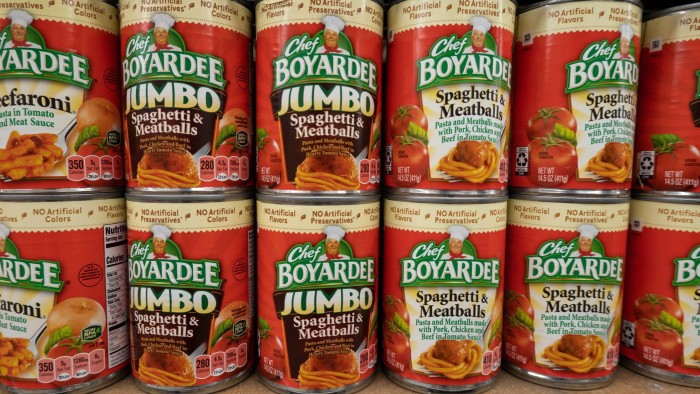Unlock the Editor’s Digest for free
Roula Khalaf, Editor of the FT, selects her favourite stories in this weekly newsletter.
Sometime after Donald Trump’s sweeping “liberation day” tariffs were unveiled, I was watching Italian television analyse the likely fallout of American protectionism when I felt a shock of recognition.
On-screen, a horrified official from Coldiretti, Italy’s powerful agribusiness lobby, was explaining how the US president’s proposed 20 per cent tariff on EU goods would make imported Italian foods more expensive for American consumers, pushing them towards “fake Italian” or “Italian-sounding” alternatives.
His table was laid with offending wares: US-made “Italian tomato sauce” and containers of grated parmesan — a cheap knock-off of Italy’s prized Parmigiano Reggiano cheese. There, among the objects of his outrage, contempt and possibly pity, I spotted one of my own favourite childhood treats: a can of Chef Boyardee spaghetti and meatballs.
I had not thought about Chef Boyardee pasta — let alone eaten it — since I was a kid. For me today, as for the Italians, the prospect of eating pre-cooked, reheated pasta from a can seems a culinary abomination.
Like most American children, I adored spaghetti with meatballs and even sang the silly song about it. But it is hard to find on restaurant menus in Italy. Here, pasta is a first course; meatballs are a second: never the twain do meet. An Italian friend says he had spaghetti and meatballs as a dish only once — in New York.
Yet the sight of that Chef Boyardee pasta evoked powerful memories of my mother’s pantry and my delight when she — tired after work — would ask me to fetch one of those precious cans for our dinner.
Overcome by my own nostalgia, I realised that Italian food producers’ case against Trump’s so-called “reciprocal tariffs” on EU imports — the dire impact on American eating habits — could fall flat.
The US imported €7.8bn worth of Italian cheese, olive oil, wines and other delicacies last year, up nearly 17 per cent from 2023 — fuelled by wholesalers stocking up ahead of tariffs. Coldiretti argues the primary victims of Trump’s tariffs — now largely paused for 90 days — will be US consumers forced to pay €1.6bn more a year for the same quantity of genuine Italian food and wine (if the tariffs are reimposed).
What really galls Italian exporters, though, is the prospect that some Americans will be priced out of genuine Italian fare, forced to downgrade to what Coldiretti sees as inferior local substitutes. They dub these “counterfeit”, as distinct from authentic Italian-made goods.
But, aside from the segment of affluent foodies — typically congregated in Democrat states or big cities — US consumers, especially Trump’s Maga base, may not notice or indeed care.
I suspect that few Americans — unlike Italians — really understand the distinction between US-made parmesan and the genuine article, which is produced in regulated quantities in Italy’s Emilia-Romagna region. Producers there must adhere to 17-pages of strict rules that even dictate what cows can eat — and where their fodder is grown.
The Parmigiano-Reggiano consortium allocates coveted cheese quotas to local dairies, polices the process and has to certify cheese as genuine and up to standard. It has set up a US office to “educate” consumers on these matters. As someone who happily dumped plenty of Kraft “parmesan” atop my childhood spaghetti, I wonder how that awareness-raising campaign will go.
Affronts to Italian sensibilities continually emerge. Just before Trump’s “liberation day”, Coldiretti warned of a what it considers a new copycat Prosecco, the sparkling wine from a precisely defined area surrounding Venice (Americans purchased around 130mn bottles last year). The launch of the California-made CalSecco had Italian wineries up in arms, provoked by the name. This apparent bid to nibble at the US market for Prosecco, valued at €500mn, led them to consider legal action, though for now they have decided against it.
Trump’s pause will keep genuine imported Italian delicacies within reach of US connoisseurs for now. But ordinary Americans’ appetite for fake Italian food is unlikely to be sated soon.
amy.kazmin@ft.com


